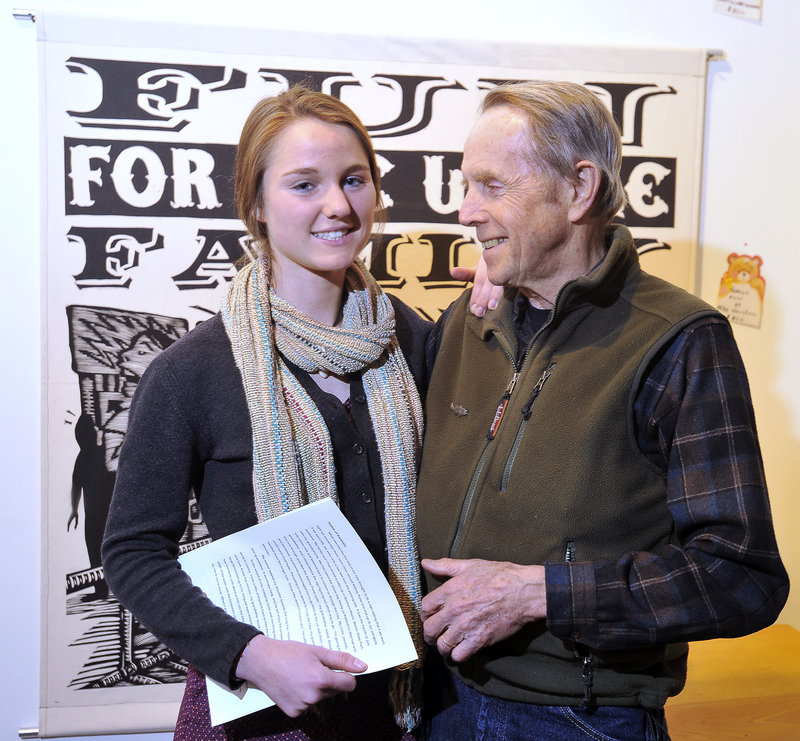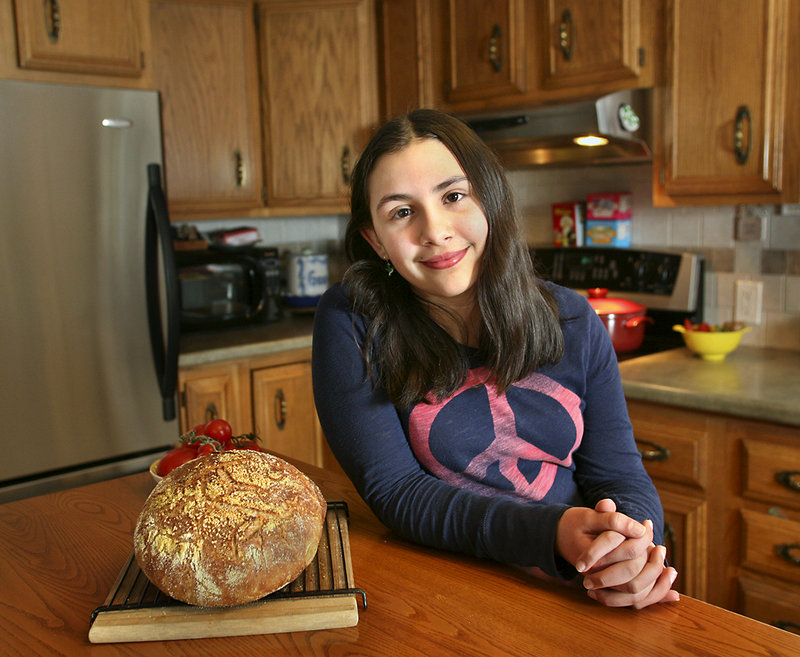Ali Perkins, a senior from the Merriconeag Waldorf School in Freeport, had never given much thought to being a food writer – she wants to be a teacher.
But there she was last Thursday night, standing on stage before a crowd at the Space Gallery in Portland, reading her essay about a hike that taught her about wild Maine foods.
In the audience was her grandfather, a key character in her essay.
Perkins, 17, was the grand prize winner in the Grades 9 to 12 category in a new food writing contest started by Slow Food Portland. The winning essays from the First Annual Young Food Writers Competition were read last week at the Sixth Annual Slow Food Portland Writers Night, an annual event that showcases the work of Maine food writers as well as writers from away.
Slow Food Portland awarded grand prizes in three grade categories. Winners in each category (essays appear at right)were given a Community Supported Agriculture (CSA) share from the farm of their choice so they can enjoy fresh Maine foods throughout the upcoming growing season.
Karl Schatz, who organized the contest, said he saw it as a way “that we could engage with young people about food and support local farmers and support agriculture.”
“It just seemed to kind of bring a lot of pieces together,” he said. “We can engage young people and support local farms by awarding three CSAs. Three farms will now have shares that they might not have sold before. It will introduce three families to the concept of the CSA, which they might not have considered as a food option before. And it spreads the word at the same time.”
Zoe Popovic, a fourth grader at Congin School in Westbrook, won the grand prize in the Grades 3 to 5 category by writing about how she can tell the seasons by what shows up in her lunchbox every day. Her family has been a member of a CSA since she first started walking. The 9-year-old’s mother, Paula Sobierajski, loads up her daughter’s lunch box every day with local foods they buy from Wolf Pine Farm in Alfred.
Zoe “does like to write,” her mother said. “She tends to write more poetry and fiction stories. This was a new experience, writing about something more personal.”
Zoe says writing will probably remain a hobby because her goal is to become a marine biologist. As for her interest in food, she does enjoy helping her mom in the kitchen sometimes.
“I’ll stir stuff, and maybe pour some stuff in the pot or something,” she said.
Ellie Sapat, a seventh grader at Falmouth Middle School, took the grand prize in the Grades 6 to 8 category. Ellie decided to enter the contest because “I do flower show essays and I enjoy cooking, and so it sounded like something I’d enjoy doing.”
Ellie loves to bake (especially desserts) and to help her mother in the family’s garden.
“We grow lettuce and cucumbers and potatoes and peaches and pears and tomatoes and eggplants sometimes,” she said. “And occasionally you have a compost pile, and sometimes we get melons in the summer from the grocery store or something, and we scoop the seeds out and they go into the compost heap and sometimes they start sprouting in the soil. It’s kind of funny.”
Ellie’s jobs in the garden are weeding, watering and “overall checking of fruit.”
“Do you ever complain?’ her mother chimed in.
“Sometimes,” Ellie replied, “but I mean, it’s nice out, and I really should enjoy it, and I do.”
Ellie didn’t know what a CSA was until her mother explained it to her. After she learned that she had won the Young Food Writers Competition, she and her mother attended the local CSA fair to scope out the farms and see which one might best suit their needs.
Ellie has decided that whichever CSA her family chooses, it will have to include honey and maple syrup, and have a pick-your-own apples operation.
“We have to buy from places that use pesticides and stuff like that,” she said, “so it’s nice that I could get organic, local stuff.”
Staff Writer Meredith Goad can be contacted at 791-6332 or at: mgoad@pressherald.com
THE WINNERS
Ali Perkins, senior, Merriconeag Waldorf School, Freeport
Ali took the grand prize in the Grades 9 to 12 category for this essay about a tasty hike she took with her grandfather:
TASTES OF KATAHDIN
What seemed like the end of our hike brought us to a sign stating that if we went right we would hike three more miles around Kidney Pond and end up at our campsite. If we went left, we were only a few feet from the parking lots. It was the Fourth of July weekend. My family and I had rented a cabin up in Northern Maine, Baxter State Park, with my grandparents. We had spent the whole day hiking up Katahdin’s Abol trail with only some nuts and balance bars to nurture us through the hike. My sister, parents, grandfather, and I stood before the sign figuring out which way to go. “I’m gonna hike this one through and take the Kidney Pond route,” my grandfather stated. Sweat stained and famished, my parents encouraged him to go back to the car with them, so they could reach food faster. Persisting to his desire to finish the hike, my grandfather headed down the longer trail. “A true hike doesn’t involve cars,” he called back over his shoulder. My mother tapped my shoulder towards the long trail. “Honey, go ahead and join your grandfather. It won’t take long, and he will enjoy the company.” To the sound of only snapping sticks and crunching leaves, we hiked around the pond in silence. I was a little annoyed to have to hike the extra distance. I was hungry and tired. Every few minutes, my grandfather would stop and feel a leaf, or hold his large binoculars up to his intrigued eyes towards the lake.
These gestures only lasted a few moments until about a mile into the hike. My grandfather had stood right on the edge of the water with the binoculars up to his face. Without removing them, he waved for me to come closer. When I arrived next to him, he held the binoculars up to my eyes. Through my focused eyes, I saw a mother moose stand in the middle of the pond, making it look shallow. Under her was her young calf nursing. I smiled, then my stomach gurgled. “Ya hungry?” my grandfather asked, removing the binoculars. “Starving!” I replied. “Well then,” he said, taking a jack knife from his jeans, and walking up to a tree. I followed him, curious as to what he had in mind. After clicking the blade out from the knife, he sliced off some of the sap that was pasted to the side of the tree. He placed the little chunk of tree sap in my hand, and told me to just chew on it, and not to swallow. I looked at the sap uncertainly. There was dirt on it, and who knows how long it had been clung on to that tree. But I was beyond hungry, enough to the point where even my mom’s attempt at meatloaf would have tasted good. So I popped the sap into my mouth. A minty bland taste filled my mouth. “Hey this isn’t bad.” I exclaimed between chews. “Yeah?” he said, plopping some into his mouth. “It’s called spruce gum, longest lasting gum you’ll ever find. Beats anything you’ll chew out of a wrapper.”
Suddenly his eyes caught something else on the side of the trail. He walked up to a large bush and plucked a leaf. “Now try eating this.” he said offering it to me. Considering the fact I was chewing on tree sap, I decided there was nothing left to lose and ate the leaf. It tasted so clear and fresh, like nothing I had ever tasted. Chomping on the gum and leaf, I gave my grandfather a thumbs up.
“Great for your breath,” he said. “Eat that before a date, and the guy will be at your front door step the next morning.” As my grandfather turned away to proceed down the trail, I stuffed a few more leaves in my pocket. The last two miles of the hike flew by. We stopped every one once in a while to try another leaf or split open an acorn to try. The hike was filled with non-stop story telling of hikes and foods my grandfather had experienced before. My hunger had completely left me, and by the time we got back to camp I didn’t want anything more but to share our experience with the drivers. The hike that began as an annoyance, became the highlight of my summer. Even in September, I was still telling my friends of the true scenes and tastes of Maine that I had shared with my grandfather.
Zoe Popovic, grade 4, Congin School, Westbrook
Zoe took the grand prize in the Grades 3 to 5 category for this essay about her school lunch:
THE SEASON IN MY STOMACH
I usually bring my own lunch to school. Sometimes the kids that buy lunch tease me. It used to bother me, but it doesn’t anymore. I know where my food comes from. I have seen it in the fields; I’ve dug my own potatoes. My food is always changing. I can tell the season by what is in my lunch box. Starting the year with the summer harvest and the green taste of basil on my juicy tomato and mozzarella sandwich. Before I know it I have a thermos filled with butternut squash ravioli with sweet apples just picked over the weekend. In winter the staples from our farm share – rice and beans. I know summer vacation is on its way when my lunch turns green again with veggie wraps filled with baby greens. I also see yogurt mixed with the preserves from last summer’s days spent picking blueberries and I know that soon I will be back in those fields. I have been a member of a CSA for as long as I can remember, whether getting a box from the farm or visiting. I know my farmers, Amy and Tom, and I know the farm. When I eat my lunch I can picture where it came from. I see the path through the fields of flowers down to vegetables. I know where to turn off to cool myself in the river. I imagine the games that I played with the other kids between courses at the potlucks. I think of the chickens running around and being ridiculous. I picture the sunflowers by the barn and remember waiting for them to have plump seeds for picking. If someone has something to say about my lunch that’s okay. It doesn’t bother me. I know where my food comes from and don’t think they can say the same. When the bell for recess rings, I offer to share a carrot and they take it with a smile and we run outside.
Ellie Sapat, grade 7, Falmouth Middle School
Ellie won the grand prize in the Grades 6 to 8 category for this essay about Maine food:
We moved to Maine because we wanted to be closer to family, make our own food, grow our own food, eat that food with our relations – and have a compost heap. In a city like Chicago, where we once lived and where people are all stuffed together, but never very close, it’s hard to enjoy these things. Life in a city seems like it has to be quick or you’re late. There’s no time to enjoy what’s truly surrounding you unless you’re on vacation and just seeing the sights. Eating Chinese takeout or ordering something from the nearest pizza house (even if it was deep dish pizza) just isn’t the same as growing, cooking and eating meals with your family. Here in Maine, I have grown tomatoes, beans, cucumbers, lettuce and the occasional melon. I know how it feels to dig up potatoes while wearing no shoes, or to pluck a ripe, juicy peach right off the tree and bite into it with glee, experiences I’d never have had if we’d stayed in the city. Maine is full of flavors that are unique, and that take time and effort to really enjoy. Take wild blueberries – it might require hours to get berries for a pie, but that pie is the best in the world, until the next one. When we pick, we enjoy the silence between the sounds of berries pattering into our containers and the occasional exclamation of joy at finding an extra large patch. In the kitchen, we chat jovially about recipes we’d like to try out, and gaze down happily at the pie that needs no recipe. With each bite, our family and close friends delight in the moments of our picking and baking – they don’t take a pie like this for granted, and neither do I.
Send questions/comments to the editors.






Success. Please wait for the page to reload. If the page does not reload within 5 seconds, please refresh the page.
Enter your email and password to access comments.
Hi, to comment on stories you must . This profile is in addition to your subscription and website login.
Already have a commenting profile? .
Invalid username/password.
Please check your email to confirm and complete your registration.
Only subscribers are eligible to post comments. Please subscribe or login first for digital access. Here’s why.
Use the form below to reset your password. When you've submitted your account email, we will send an email with a reset code.